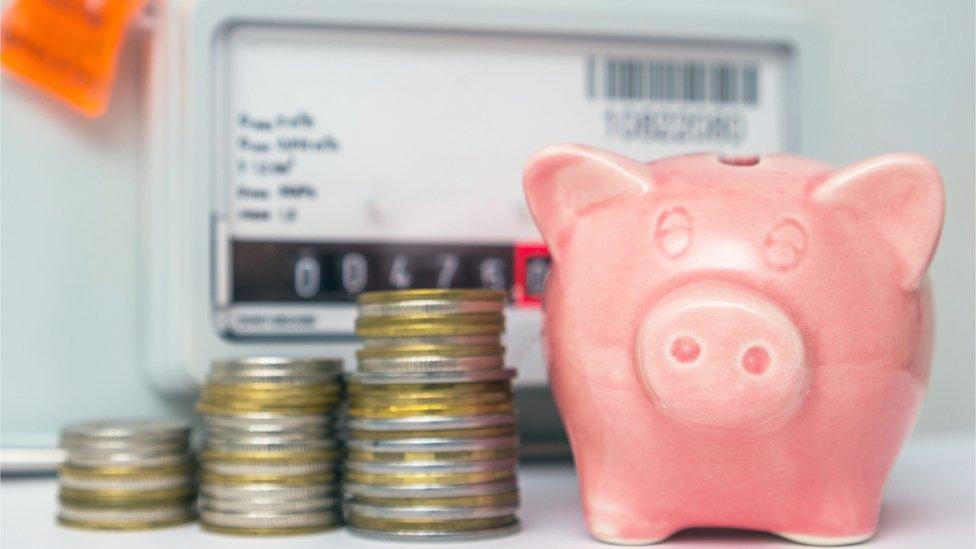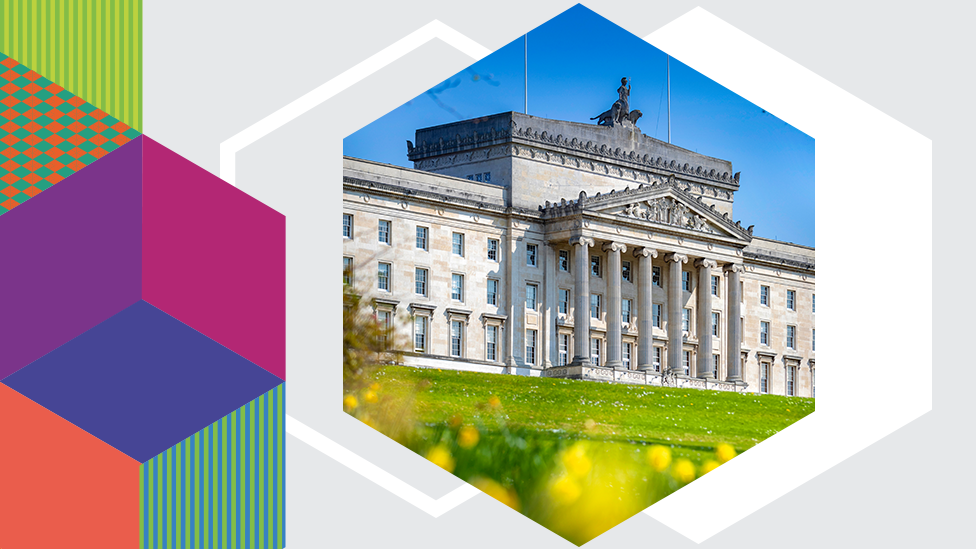NI election 2022: What are parties pledging on the cost of living?
- Published

Many people are feeling the squeeze due to the rising cost of living
The cost of living crisis has been a significant issue on the doorsteps during the Northern Ireland Assembly election campaign.
But what are the major parties planning to do about it?
What has happened already?
In March, Stormont's Department for Communities implemented a £55m energy payment support scheme, which paid £200 grants to about 280,000 people.
It was targeted at people on benefits, with no application process required.
It went to people claiming Universal Credit, income-based Jobseekers' Allowance, income support, income-related employment and support allowance and pension credit.
Between January and March there was also a £2m emergency winter fuel fund, which paid £100 to successful applicants.

SIGN UP FOR ALERTS: Get extra updates on BBC Northern Ireland election coverage

Is there more money to spend?
The Northern Ireland Executive has a pot of about £330m that it could use.
This is money which has been allocated to Northern Ireland as part of wider UK public spending decisions.
It is not certain that all that money would be used to help with the cost of living.
For example, the Department of Health is likely to want additional funding to help tackle ongoing Covid-related pressures.
So - what has each party proposed?
DUP
The Democratic Unionist Party is also proposing an energy support scheme but says the eligibility criteria of the previous version was too narrow.
It says it wants to redesign that scheme so it can help more lower-paid workers.
A big focus of the DUP cost of living plan is childcare.
In other parts of the UK, eligible working parents of three and four year olds are entitled to 30 hours of free childcare a week.
That does not apply in Northern Ireland - instead all parents of three and four year olds can apply for at least 12.5 hours per week of funded pre-school education.
The DUP wants to introduce a free 30-hours scheme to Northern Ireland.
Sinn Féin
The party wants to give every household in Northern Ireland a one-off payment of £230 which, it says, would cost £177m.
The delivery of this could be similar to the Spend Local high street voucher, which provided a £100 pre-loaded debit card to almost all adults in Northern Ireland.
Sinn Féin would also rerun the energy payment support scheme, this time paying grants of £100. It says this would cost £27m.
The party would also reopen the emergency fuel fund with an increased pot of £8m.
Its other proposals include an extra £9m for an existing discretionary support scheme.
SDLP
The SDLP is also proposing a universal household payment, though it would set it at £200.
It would also reopen the £100 emergency fuel fund and keep it running until the end of this year.
The party would also restart the free school meals payment scheme.
It was introduced during the Covid lockdown to make sure families did not experience hardship as a result of schools closing.
Under that scheme, qualifying families got £2.70 per child, per day for each day of term that schools were closed.
The SDLP would restart it from 1 April and run it until the end of the year, including the summer holidays.
It says that for a family with two children this would mean an additional £108 a month.
UUP
The Ulster Unionist Party says it will work to have the warm homes discount scheme, which operates elsewhere in the UK, rolled out in Northern Ireland.
It is a one-off payment to reduce eligible customers' electricity bills over the winter months. This coming winter (2022-23), it will be worth £150.
The party also wants to establish a fuel poverty task force.
It says any new support packages should be designed in tandem with local councils to target those most exposed to the impact of the cost of living crisis.
The party would also like home heating oil provision to come under the remit of the Utility Regulator. Unlike gas and electricity the supply of oil is not subject to any price regulation.
Alliance
The Alliance Party is also proposing a measure similar to the free school meals payment scheme.
Their child payment scheme would take the form of a per child weekly payment for any family with children in receipt of free school meals.
It would also apply to pre-school age children in low-income households.
Its other main measure in this area is the creation of a home heating support grant voucher scheme.
This would target low-income households, which the party says will suffer a disproportionate impact from rising energy costs.
Smaller parties
You can find out what the Green Party, Traditional Unionist Voice (TUV), People Before Profit and Aontú are promising you by visiting BBC News NI's interactive policy guide.
What are the caveats?
For any of this to happen an executive would need to be formed following the election and that is not certain.
The system of power sharing at the executive also means that no party is ever in a position to fully deliver its manifesto.
Instead major spending decisions such as this would need to be negotiated and agreed around the executive table.

POSTCODE SEARCH: Who is standing in my area?
WHAT'S HAPPENING WHERE: Really simple guide
NORTHERN IRELAND: Essential guide to the Northern Ireland election
NOTIFICATIONS: Sign up for Northern Ireland election alerts

- Published14 April 2022

- Published8 April 2022

- Published4 May 2022
